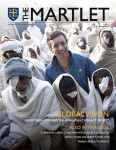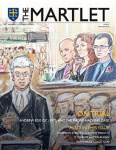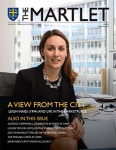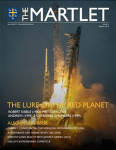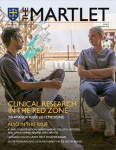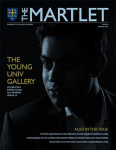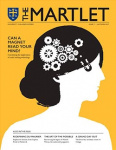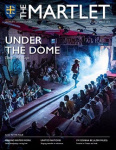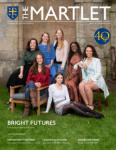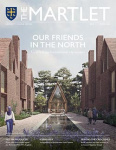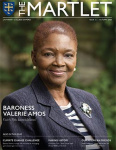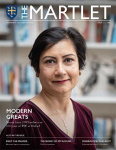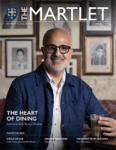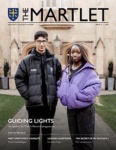Problem-solving, poetry and paradigm-shifts
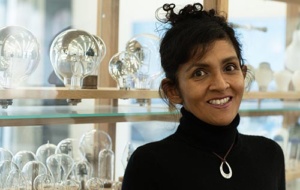
Photo by Sophie Erlund
Pireeni Sundaralingam (1986, Experimental Psychology) is College’s inaugural Poet Laureate. The position will be for three years and begun in Hilary Term 2023. A multiple award-winning poet, Pireeni’s work has been published in over 30 literary journals and translated into five languages.
You’re both a cognitive scientist and a poet. Are these two things related for you?
I’m fascinated by the cognitive and neural processes of “thinking outside the box”: the mechanisms that allow us to invent tools, innovate new business solutions and create radical paradigm-shifts in both the sciences and the arts. And what processes lead us to get trapped in mental cul-de-sacs, leaving us prey to fear-based thinking and political polarisation, or diminishing our agility to adapt to the future? The ability to reframe situations, to look at things from different perspectives, is essential to our resilience, both as individuals and as a society.
Cognitive psychologists at Michigan State University noted that those STEM graduates who had an arts practice on the side created a significantly higher number of patents, research publications, and founded more companies, than those without an arts practice. Data suggests that it’s not even the quality of the art/music that is produced but the regular practice of “stretching the brain” that boosted the inventiveness of these scientists and entrepreneurs. The arts in general encourage us to find new ways of looking at what lies right in front of us.
I would argue that poetry, with its conjoint skills of close observation, mapping analogies between disparate situations and mental reframing, is one of the best practices for supporting our ability to think and rethink. Some of my favourite poems are those which jolt the reader into seeing even the most mundane objects in radically new ways, such as Pablo Neruda’s Odes to Common Things or Thomas Transtromer’s poems in his collection The Deleted World. As our very own Shelley once noted: “Poetry is the art of making the familiar, unfamiliar.”
What do you see as the role of the poet in modern-day society?
For many decades, there’s been a tendency to value poetry purely for its emotional or aesthetic dimensions. While these are definitely valuable qualities, poetry is also a vital component in our cognitive toolkit, a key catalyst for helping us think better. Many of the skills that we treasure and invest in at Univ, including deep reading, analytical thinking, and originality of thought, are increasingly under pressure in our current society. The research programme I’ve been leading at Silicon Valley’s Center for Humane Technology indicates that the algorithms underlying most of the major tech platforms with which we interact these days – from search engines to social media – are downgrading our ability to engage in both flexible and original thinking. We’re seeing the fallout in all kinds of creative industries from architecture to advertising, with a downtick in the production of original ideas.
Yet we will need cognitive systems that are more agile, not less, if we are to adapt to the unprecedented levels of global change that we are now facing.
Are you a proponent of art-science interdisciplinarity?
In terms of tackling the planet’s greatest problems, whether it’s climate change or global health, we obviously need not just a diversity of approaches but also in-built mechanisms for questioning and adapting our methodologies to the rapidly evolving situations we’re now facing.
Additionally, arts modalities can often convey ideas and information more effectively than direct messaging ofscientific information alone. A few years ago I was tasked with assessing, on behalf of the United Nation’s Sustainable Development Goals action portal, how the arts might play a role in mobilising populations to take action; I subsequently had the wonderful opportunity to create a “nudge unit”, using data-driven cognitive and behavioural science techniques to select specific arts modalities that would not only communicate information about the SDGs but also enact authentic behaviour change in different populations.
I very much appreciate Univ’s capability as an “ideas collider”: we’re so fortunate to be able to bump into colleagues from a diversity of disciplines simply by walking through the quads or sitting down to eat in Hall. Interdisciplinary debate can spark such deep paradigm-shifts; I’m excited that Sir Ivor Crewe, former Master of Univ, was keen to emphasise my function as an interdisciplinary catalyst as part of my role as College poet laureate. It is in the very DNA of Univ. After all, Shelley, Univ’s most famous poet, spent hours running science experiments in his rooms.
What do you hope to do as College poet laureate?
I’m looking forward to catalysing ways of thinking differently! I’ll be hosting a diverse programme of events. A few highlights include: a regular Creativity Salon, exploring the neuroscience of creativity and how to catalyse creativity in our respective fields; a podcast series, interviewing paradigm-shifting thinkers from a diversity of fields; live panels bringing together artists and scientists to discuss interdisciplinary approaches to some of the world’s most challenging issues; poetry-read-a-thons (alumni welcome!); and of course both poetry and creative thinking workshops. And there will be Poetic Happenings in the quads, so stay tuned!
What do you plan to write about while you are at Univ?
I’m fascinated by the phenomenon of Univ as an incubator of ideas, with layers going back down so many centuries. I’m planning to write a series of lyric essay-prose poems, interweaving lives of different Univ artists and scientists, together with a multi-sensory conjuring of the sensory landscape of College: space and time mapped against each other. We’ll be translating this into an audio-tour which will also include the latest augmented reality (AR), as well as a printed collection.
This feature was adapted from one first published in Issue 15 of The Martlet; read the full magazine here or explore our back catalogue of Martlets below:
Published: 9 May 2023

